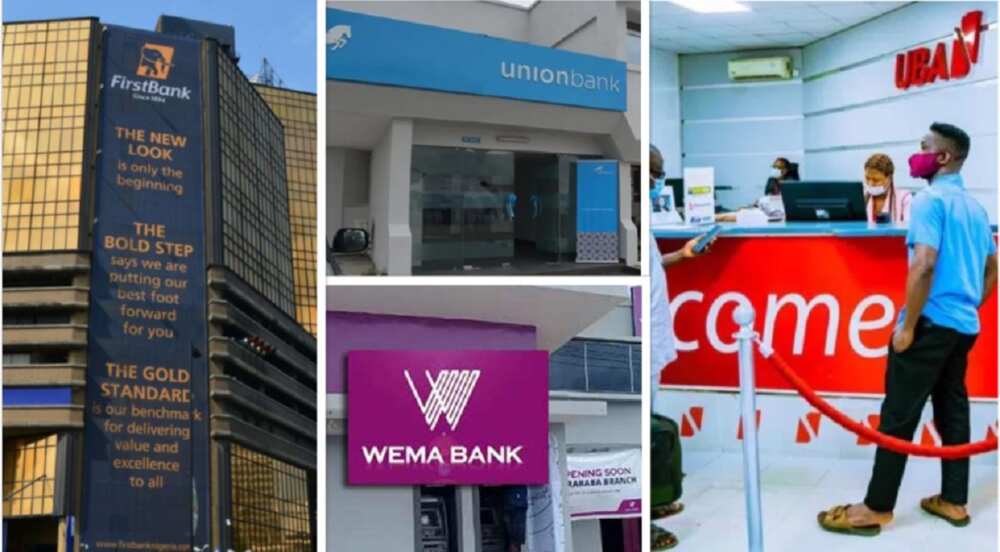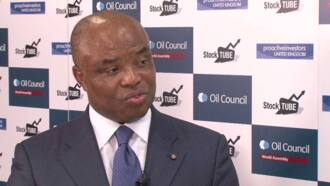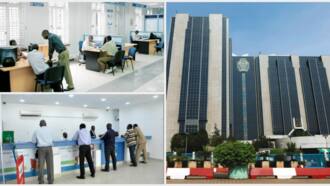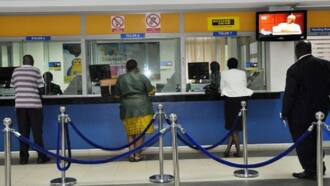Over 100 Years Old: First Bank, Union Bank, 8 Other Oldest Banks in Nigeria
Nigeria has one of the most stable and buoyant banking sectors in Africa. Nigerian banks have, over the years, proven their resilience to withstand financial storms.
PAY ATTENTION: Fuel your passion for sports with SportBrief.com. Click here to discover the latest sports updates!
Many Nigerian banks have maintained a considerable presence over an extended period. Their extensive and noteworthy history has led to various instances of rebranding, undergoing multiple rounds of mergers and acquisitions.
As a result, they have strengthened their positions and enhanced their security significantly compared to their previous benchmarks.
In this article, Legit.ng highlights Nigeria's top 10 oldest banks, tracing their foundation and different transitions to their current state.

Source: UGC
First Bank of Nigeria
In 1894, Sir Alfred Jones, a prominent shipping magnate from Liverpool, England, established First Bank.
PAY ATTENTION: Сheck out news that is picked exactly for YOU ➡️ find the “Recommended for you” block on the home page and enjoy!

Read also
Court freezes Seplat Energy founder Bryant Orjiako’s account over indebtedness to Access Bank
Initially headquartered in Liverpool, the institution initiated its operations in Lagos, Nigeria, with the appellation Bank of British West Africa (BBWA). Subsequently, in 1957, the bank was renamed, transitioning from Bank of British West Africa (BBWA) to Bank of West Africa (BWA).
A pivotal juncture occurred in 1966 when the bank merged with Standard Bank, UK, leading to its new identity as Standard Bank of West Africa Limited.
The year 1969 marked its local incorporation as the Standard Bank of Nigeria Limited. Notable modifications to the bank's nomenclature took place in 1979 and 1991, resulting in the names First Bank of Nigeria Limited and First Bank of Nigeria Plc, respectively.
A further name adjustment happened in 2012, rebranding the institution as FirstBank of Nigeria Limited as part of an overarching restructuring that gave rise to FBN Holdings Plc.
Union Bank
Union Bank of Nigeria holds the distinction of being the second-oldest bank in the nation. In 1925, it transformed into Barclays Bank DCO (Dominion, Colonial and Overseas) due to its acquisition by Barclays Bank.

Read also
After buying Standard Chartered’s sub-saharan banks, Access Holdings acquires $7m stake in Kenyan subsidiary
After Nigeria gained independence and with the enactment of the Companies Act of 1968, the bank achieved incorporation under the name Barclays Bank of Nigeria Limited.
In accordance with the evolving ownership structure and adherence to the Companies and Allied Matters Act of 1990, it embraced the appellation Union Bank of Nigeria Plc.
In alignment with the Central Bank of Nigeria's (CBN) strategy for consolidating the banking sector, Union Bank of Nigeria Plc orchestrated the acquisition of the erstwhile Universal Trust Bank Plc and Broad Bank Ltd.
This initiative also encompassed the integration of its former subsidiary, Union Merchant Bank Ltd.
Wema Bank
Established in the country in 1945, Wema Bank Plc boasts a storied history of growth and development. It has ascended from modest origins to attain the status of an acclaimed National Bank, distinguished by its extensive network of branches spanning the nation and its pioneering technology within the industry.
Founded initially as Agbonmagbe Bank Limited in 1945, coinciding with the conclusion of the Second World War, this financial entity underwent a metamorphosis into Wema Bank Plc, marking the inception of a fresh chapter in its remarkable journey toward eminence.
United Bank for Africa
With a history spanning more than seven decades of continuous banking operations, the United Bank for Africa (UBA) traces its origins to 1949 when the British and French Bank Limited (BFB) initiated its banking activities in Nigeria.
As the foremost sub-Saharan African financial institution, UBA is pivotal in fostering connections among individuals and enterprises across the continent.
Through its offerings in retail and corporate banking, innovative cross-border payment solutions, trade finance, and investment banking, UBA has solidified its position.
Notably, a significant milestone occurred in 2005 when they orchestrated a merger with Standard Trust Bank (STB), a monumental stride in the annals of sub-Saharan Africa.
Since this transformative amalgamation, UBA's reputation has transcended regional boundaries, evolving into a truly global brand.
Sterling Bank
In 1960, Sterling Bank embarked on its operational journey under the name NAL Bank.
A pivotal moment arrived in January 2006 when NAL Bank orchestrated a merger encompassing four other prominent Nigerian banks: Magnum Trust Bank, NBM, Trust Bank of Africa, and Indo-Nigeria Merchant Bank (INMB).
This amalgamation led to a seamless integration of these combined entities, now functioning as a unified group under the banner of Sterling Bank.
Subsequently, in 2012, the bank took on another significant stride by absorbing the complete business portfolio of the erstwhile Equatorial Trust Bank (ETB) and, in 2023, transformed into a holding company.
Heritage Bank
Heritage Bank traces its origins to the late 1970s, an era marked by the establishment of Societe Generale Bank (Nigeria) (SGBN) by the late Dr Olusola Saraki.

Read also
"Don't write-off": CBN sets sanctions for top directors taking loans as 4 banks approve over N112bn
Upon securing the banking license, the incoming proprietors rebranded the institution as Heritage Banking Company Limited, marking the commencement of its operations on March 4, 2013.
An important milestone occurred when Heritage Banking Company Ltd fulfilled the requisites stipulated by the Asset Management Corporation of Nigeria (AMCON) and the Central Bank of Nigeria (CBN) to attain full ownership of Enterprise Bank Ltd on January 27, 2015.
First City Monument Bank (FCMB)
City Securities Limited (CSL), the foundational entity from which the lineage of First City Monument Bank (FCMB) originates, was established in 1977 by Oloye Subomi Balogun, known as the Otunba Tunwashe of Ijebu, a distinguished Yoruba traditional noble.
In 1982, CSL played a pivotal role by providing the initial capital for establishing First City Merchant Bank, which obtained a banking license on August 11, 1983.
With the bank's evolution into a universal banking institution in 2001, a consequential alteration occurred: the name transitioned from First City Merchant Bank to First City Monument Bank Limited.

Read also
CBN, experts speak on Access, Zenith others' health as NDIC refunds money to 182 failed banks depositors
Ecobank Nigeria
In 1989, the inception of Ecobank Nigeria marked the commencement of its operational journey.
As a universal banking entity, it serves as a comprehensive financial institution, catering to the diverse needs of its clientele in the Nigerian market, encompassing wholesale, retail, corporate, investment, and transaction banking services.
In a transformative move, Ecobank Nigeria, under the umbrella of its parent company Ecobank Transnational Inc. (ETI), achieved complete ownership of Oceanic Bank during the fourth quarter of 2011.
This strategic acquisition led to the establishment of the expanded Ecobank Nigeria Limited, further solidifying its position within the financial landscape.
Fidelity Bank
Established in 1987, Fidelity Bank of Nigeria embarked on its operational journey in 1988 after obtaining a Merchant Banking license.
Seeking growth, the bank embarked on a transformational path. In 1999, it transitioned from a merchant bank to a commercial bank, initially as a private limited company.

Read also
Remember Oceanic, Skye, Bank PHB? Here's a list of 7 popular banks that have stopped operating in Nigeria
By August of the same year, it changed its corporate status, becoming a public limited company and adopting the name Fidelity Bank Plc.
The evolution continued in February 2001, when it obtained a Universal Banking License, broadening its scope of services.
Building on its achievements, the bank reached another milestone in 2011 by securing an International Banking License, further enhancing its global capabilities.
Access Bank
The Central Bank of Nigeria granted the bank its license in 1989, and in 1998, it achieved a listing on the Nigerian Stock Exchange.
A pivotal transition occurred in 2002 when Access Bank changed leadership, led by Aigboje Aig-Imoukhuede and Herbert Wigwe.
This ushered in a new era for the bank. Subsequently, in 2005, Access Bank merged, acquiring Marina Bank and Capital Bank (formerly known as Commercial Bank Crédit Lyonnais Nigeria).
This strategic move contributed to its expansion. The bank has demonstrated its commitment to growth by establishing branches and acquiring other financial institutions in various regions of Africa, including Rwanda, Congo, Angola, Kenya, Mozambique, and more.
Top 10 Commercial Banks in Nigeria Ranked by Workers' Salaries
In 2022, ten commercial banks listed on the Nigerian exchange disbursed N1.30 trillion to their personnel to cover various expenses such as salaries, wages, and pensions.
This amount signifies a noteworthy surge of 13.10% compared to the previous year's N1.15 trillion, which the banks spent on workforce-related costs.
The analysis by Legit.ng reveals that Ecobank emerged with the highest staff expenditure in 2022, trailed by UBA and Access Bank.
Conversely, Unity, Fidelity, and Wema reported the lowest expenditure in this category.
Notably, Ecobank registered the most substantial increase in staff expenses among all the analysed banks, with an increment of N75 billion over the preceding year.
Source: Legit.ng



